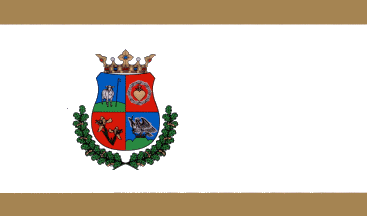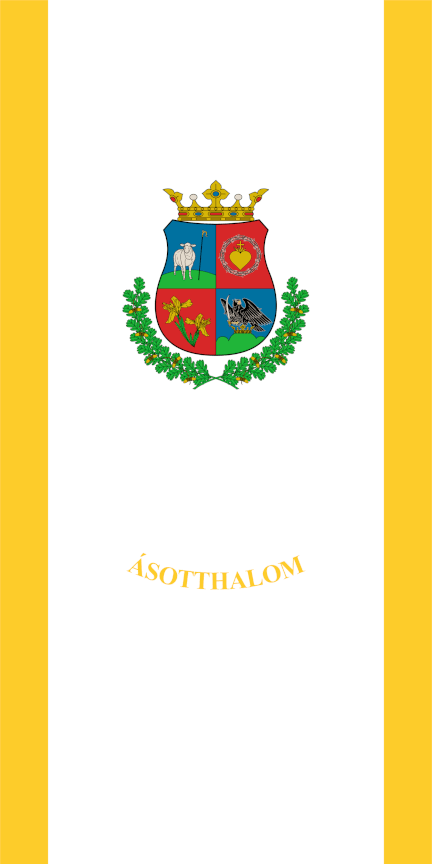 (3:5)
(3:5)image by Zoltan Horvath, 20 January 2025

Last modified: 2025-01-25 by zoltán horváth
Keywords: asotthalom | hungary | csongrad | cross | lamb | turul | bird | atilla | sword | iris | crown |
Links: FOTW homepage |
search |
disclaimer and copyright |
write us |
mirrors
 (3:5)
(3:5)
image by Zoltan Horvath, 20 January 2025
See also:
Ásotthalom is a village in Csongrád County in Hungary near
to City of Szeged (33 km west). The
village has got 4.106 inhabitants (1990 census), all of them are
Hungarians. Neighbouring settlements are: Mórahalom,
Ruzsa, Öttömös,
Kelebia villages and Subotica / Szabadka community (Yugoslavia).
The settlement is a farmland with two larger center: Kissor
(Little Terrace) and Gátsor (Gát Terrace).
The territory of the settlement is inhabited from the Bronze Age.
In the early Middle Ages many settlements were here. One of them
was Átokháza, which was settled by Cumanian settlers in 1280.
At the time of the Turkish wars the territory was devastated and
became a part of Szeged City. The first mention of
Ásotthalom as one territory of the farms on the territory of
Szeged City is from 1778. In 1850 City of Szeged built a new farm
in the center of nowadays settlement: Várostanya. Ásotthalom
became a new independent settlement in 1950.
Istvan Molnar, 8 March 2001
The symbols of municipality were originally adopted by Local Government Decree 9/1997. (VII. 17.) issued on 17 July 1997, but a new Local Government Decree 3/2023. (II. 15.) was adopted on 15 February 2023.
https://or.njt.hu/eli/726632/r/2023/3
The major difference between the two legislation is separate description of horizontal and vertical flag.
Ratio of horizontal flag is 3:5, while ratio of vertical flag is 1:2. The name of the settlement is written under the coat of arms in both versions.
This is placed in the lower one-third of the flag in case of vertical flag.
Images of flag:
https://asotthalom.hu/wp-content/uploads/2023/06/Helyi-Ertektar-Asotthalom-Jo.pdf (page 5)
https://24.hu/belfold/2020/08/24/kituztek-a-pride-zaszlot-asotthalmon-is/
https://radio7.hu/rovasirasos-nevtablat-kapott-asotthalom
Zoltan Horvath, 20 January 2025
 (1:2)
(1:2)
image by Zoltan Horvath, 20 January 2025
The flag of the city - Verical , CoA on white was located at
<www.c3.hu/~ahalom/Cimerz.jpg>.
Dov Gutterman, 28 December 1998
cs-as.gif)
image by Zoltan Horvath, 20 January 2025
The flag and the coat of arms were adopted on 28. July 1997 by the
Resolution No. 9/1997. (VII.17.) at <www.morahalom.hu>.
Description of the coat of arms of the village: The form of the standing
shield divided into four parts relates to the satchel of
herdsmen. In the left red field, in the silver thorn wreath there
is a gold cross growing from the gold flames dartig up from a
gold heart. This symbol relates to the living religious life of
the community and the title of the church: 'The Holy Heart of
Jesus Christ". In the right blue field there is a silver
lamb, near it there is a black sheperd's crook stuck into the
green field. These symbols relate to the occupation of the
members of the settlements from the Hungarian Conquest to
nowadays: the shepherding. Even the "Emperor and King"
Francis-Joseph I. had eaten the meal cooked by the local
sheperds. The lamb relates to the pastures leased by the City of
Szeged. In the bottom left blue field, on the central higher hill
of the green triplicate hills there is a black TURUL (bird)
turned right looked at left and its wings are spread. In the
right gold talon of the bird there is a silver sword with gold
hilt. This symbol relates to the name of the settlement.
Ásotthalom means 'Excavated Hill'. There was the seat of Atilla
the Great King of the Huns by the legends and many people made
excavations trying to find his jewels. The black TURUL was
Atilla's symbol by the legends. In the right bottom red field
there is a "sand iris" (?) relates to the flora of the
settlement. The crown above the shield relates to the
selfgovernment of the village.
Informations from the website of the settlement.
Istvan Molnar, 8 March 2001